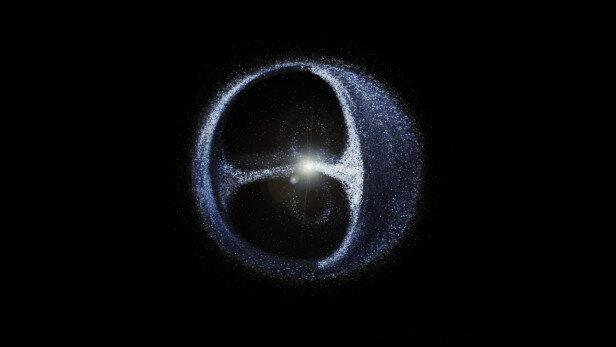KONSTANTIN BATYGIN: In our daily experience we are used to thinking of events as being separated in space and separated in time and there's a true kind of sense of simultaneity, where two things that are separated in space happen in the same time, and we're okay with that. As it turns out, that's only an approximate view of what's really happening. In reality, space and time are strongly intertwined things and the union of them is called spacetime. Now spacetime is the grid if you will of this world. It is the coordinate system on which everything happens. And gravity tends to bend that coordinate system. And so indeed, gravity what we experience as falling, for example if we jump off a little hill or something like that, that is nothing. That is just a manifestation of the fact that spacetime continuum itself is being curved by the gravitational field of the Earth. What does this mean? What does this curving mean? It means that depending on how close you are to the source of gravity, time will pass at different rates. That said, biologically you will not experience it differently one way or another. The only thing that this is useful for is if you wanted to build a time machine.
So a time machine can never go backwards in time, but you can make a time machine that goes forward in time. Suppose you are a fan of some Netflix series and you want to watch the whole thing and you don't want to wait for different seasons to come out one year apart. You just want to binge watch the whole thing now. Then what you do is you build a planet and then you put yourself in the center so that you are experiencing no gravitational field because you are weightless in the center of the planet. You drill a hole and then you put a TV outside of the planet, submerge the TV in the gravitational field so that time passes more rapidly for the TV and then you watch. So, as a biological being you will not experience aging any differently at least due to gravity. You will not experience aging any differently if you live on a mountain or on the surface of the Earth.
Forbes named professor Konstantin Batygin the “next physics rock star” in its 2015 list of “30 Under 30: Young Scientists Who Are Changing the World.” He received his bachelor’s degree[…]
Time travel is possible, but only in one direction.
▸
3 min
—
with
Sign up for Big Think on Substack
The most surprising and impactful new stories delivered to your inbox every week, for free.
For more from Batygin, visit konstantinbatygin.com.
Related
Astronomers possibly solve the mystery of how the enormous Oort cloud, with over 100 billion comet-like objects, was formed.
Researchers propose a new method that could definitively prove the existence of dark matter.
Two new studies examine ways we could engineer human wormhole travel.
Some scientists believe the lightning-produced frequencies may be connected to our brain waves, meditation, and hypnosis.
NASA astronomer Michelle Thaller is coming back to Big Think’s studio soon to answer YOUR questions! Here’s all you need to know to submit your science-related inquiries.





